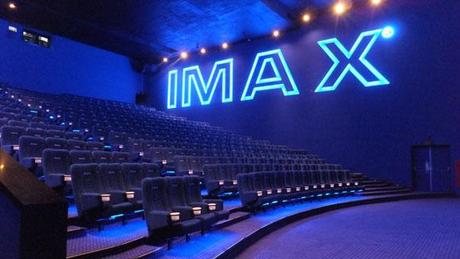You've likely already read or heard plenty of numbers associated with Thor: Ragnarok, like $122 million (its domestic debut), $55 million (its record-setting debut in China) $306 million (its international total after 10 days), and $427 million (its worldwide total to date). Congratulations, Marvel Studios did the Marvel Studios thing, and the whole world gets to celebrate. Ragnarok is a joyful time at the movies at a time when joy is desperately called for.
Here's another number: 73%. That's how much of the total domestic box office Thor was responsible for this weekend.
No big deal, right? Big movie equals an even bigger slice of the box office pie.
Here are some other numbers, though: $76m, $95m, $100m, $105m, $90m, $117m, $112m. That, in order, is the collective box office total for every weekend between the release of Ragnarok and It.

So what if Ragnarok made more than every single movie combined has been able to in a single weekend over the past two months? What all of those movies did was normal-to-poor business; what Ragnarok just did was decidedly abnormal, 2 8th best opening weekend of all time and all that. September is usually a bad month for new movies anyway, and October, well, this October kinda sucked. These things happen.
Yeah, but they keep happening.






Not included above: April was down nearly 30% from 2016 and January down 16%. Plus, Summer and Fall have been in decline for two straight years now.
















But there's always some big box office savior around the corner:
We have been here time and time again over the past couple of years. After an extended period of relative inactivity and less than notable business, some big new comic book, animated, live-action fairy tale, or Star Wars movie (or, every now and then, a horror movie) comes along to give the box office a jolt. The fresh injection of money acts like a hit from a defibrillator machine shocking the box office back to life, turning what had been a flatlining heart rate into a steady rhythm. That is, of course, until the effect wears off and the patient needs another defibrillator save.
To some degree, this has always been true of Hollywood, but, to paraphrase Homer Simpson, the lows are more terrifying, highs more dizzying and creamy middle increasingly non-existent:
2017 didn't start off this way. The first three months of the year were solid with movies big ( Logan, Beauty and the Beast, Skull Island) and small ( Get Out, Split) finding a sufficient-to-impressively-large audience with only a few absolute duds ( CHiPS, The Great Wall, Ghost in the Shell).
Since then, as Forbes pointed out, we've hit a wall. " Fate of the Furious did fine but everything else in April died badly. The first three months of summer were totally dominated by a respective comic book superhero movie ( Guardians of the Galaxy Vol. 2, Wonder Woman, Spider-Man: Homecoming) with almost everything else save for Despicable Me 3 either underperforming or performing well enough (Baby Driver, The Big Sick, etc.) within limited expectations. The next three months were each somewhat dominated by a single horror movie while almost everything else perished in flames."
We've reached a point where each new month lives or dies on the success or lack thereof of its big new tentpole. This September was the highest-grossing of all time because of It. On the flipside, this October was the lowest-grossing in decades because of Blade Runner: 2049. The summer was so bad because most of the big movies failed to make as much as they were supposed to. It's a boom or bust cycle built around our increasing unwillingness to pay to see any movie that doesn't feel like some kind of event. If it's not something we can't already get in a better form through the latest prestige TV show on Netflix or something we don't mind waiting for then we simply won't go.
Last year had a run from January to September where essentially the only breakout movies were comic book/superhero movies and kid-targeted animated biggies. But at least September and October offered solid numbers from Sully, The Accountant and The Magnificent Seven. This Fall didn't even get adult-skewing hits on that scale, let alone The Martian or even Gone Girl.
That's not entirely on us, though. We've been conditioned into this by Hollywood. For years, the theater owners lobbied the film studios to abandon the rigid old way of funneling the biggest movies of the year into either the summer or winter. It took a couple of historically awful summers for them to come around but eventually, they did, thus resulting in the year-round tentpole cinema we currently enjoy.
In the process, the definition of what seems worthy of a ticket purchase has changed, aided, no doubt, by the concurrent efforts of the theater owners to push hard into premium seating, fancier concessions, and bigger screens. As the theaters adjust to create an environment we can't as easily replicate at home Hollywood rushes to provide them with the tentpoles which seem worthy of such palaces.
Watching Brad's Status, for example, on a big screen with heated recliner seats and a beer menu is a vastly different experience than doing the same with Blade Runner: 2049. One feels worthy of the setting, the other remarkably out of place.
The rest of the year promises more of the same, with astonishingly few wide releases not-named Justice League, Coco or Star Wars. We've yet to see even a single traditional Oscar contender breakout or make any noise whatsoever, really. And next year will likely be dominated by Black Panther, New Mutants, Infinity War, Solo, Deadpool 2, The Incredibles 2, Jurassic World 2, Mission Impossible 6 and so on.
The theory used to be that with blockbusters the rising tide lifts all ships. More people in theaters is an objectively good thing. It means more eyeballs in front of trailers and posters and a higher likelihood of them coming back to see something else. These days, that mostly just means them coming back for the next big tentpole. Anything else in-between? Meh.

